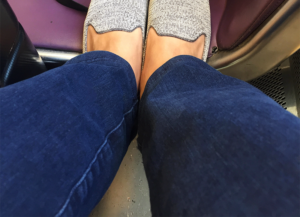 “Burned Out in Boston” wants to reach financial independence.
“Burned Out in Boston” wants to reach financial independence.
But she’s not sure she can stick it out in Boston much longer.
She and her husband want to move to an area that doesn’t have many job prospects, and they want to make this leap soon, ideally before they reach FI. How do they know when it’s the right time to jump ship to their dream location?
Ingrid and her husband own two rentals. They’re torn between paying one of their rentals off or buying more properties. Which is the better route to take?
Pat is torn: should she convert her garage into an accessory dwelling unit, or use funds to buy an out-of-state rental property?
Chelsea wants to know: what should you do if your newly purchased home is an instant money pit?
Julia wants to know how to approach investing in sector-specific index funds, like utility ETFs. Should they be a small or large portion of your portfolio?
I answer these five questions in today’s episode. Enjoy!
Burned Out in Boston asks (at 1:03 minutes):
When’s the best time to make a big lifestyle change?
My husband and I are in our early 40s and we live in Boston. Our only debt is our mortgage, and our net worth is around $1.1 million.
About $300,000 of our net worth is equity in our house, and most of the remaining $800,000 is in traditional pre-tax retirement accounts. Only about $80,000 is in cash or taxable retirement accounts. We’ve made about $70,000 in Roth contributions in IRAs or our workplace accounts. We don’t have a lot we can easily draw from if we retire early.
We’re in good financial shape, but we’re not financially independent (FI) yet. Our target number is $1.2 million, not including the equity in our home.
The thing is, big city living is slowly killing us. Our dream is to move to a quieter, slower-paced life closer to the outdoor spaces where we spend most of our free time.
We also want to road trip a month or two each year. We don’t want to fully retire — we’re happy to semi-retire or take a mini-retirement. The problem is, the area in which we want to move doesn’t have many job prospects for us.
Our expenses are $45,000 per year and we’re able to save $60,000 – $70,000 per year. We’re committed to working here in Boston for two more years until I fully vest in my employer’s retirement plan. I don’t know if we can stick it out much longer than that. If we move to the area we’re eyeing, we can use the equity we’ve built up in our current house to purchase our next house outright which would lower our monthly expenses.
Is it irresponsible to move away from the city before we’re FI, when we could get there a lot quicker by staying here?
Should we change our savings strategy in the next few years so we have more in taxable accounts or Roth contributions that we can draw from before we turn 59.5 years old?
Chelsea asks (at 8:45 minutes):
I’m 28 years old and live in Birmingham, AL. My wife and I bought a house a year and a half ago under the impression that it was move-in ready.
We had an inspection done and visited the house several times, and everything seemed okay.
However, the ceilings in the bathroom and living room have fallen in from water damage, we depleted our emergency fund trying to fix our HVAC, and we fixed water damage in the master bedroom. It feels like one thing after another. Is there anything we can do?
**Clarification added:**
A listener pointed out that the disclosure form is not obligatory in Alabama, but the disclosure itself is still required. It’s also required in Alabama that the seller, by law, must disclose all material defects.
Here’s the specific language that we found:
Alabama law provides that a seller or seller’s agent has a duty to disclose information about used real estate in three scenarios – 1) Defects affecting health and safety, 2) where a fiduciary relationship exists, and 3) upon specific inquiry by the buyer. See Moore, 849 So. 2d 914 (Ala. 2002); see also Ala. Code § 6-5-102 (1975).
Health and Safety
The Health or Safety Exception is relatively straightforward. A seller or seller’s agent has a duty to disclose when he or she –
1) has knowledge of a
2) material defect or condition
3) that affects health or safety, and
4) the defect or condition is not known to or readily observable by the buyer.
Pat asks (at 22:24 minutes):
I live in Los Angeles and I’m thinking of converting my garage into an accessory dwelling unit (ADU). The estimated conversion cost is $100,000, and I could rent it out for a minimum of $1,500 per month.
Should I pay for this with a home equity line of credit (HELOC), or should I refinance my mortgage (currently at 4.25 percent)?
Adding the ADU would increase the value of my house, though I won’t sell it for at least five or more years. However, my lot isn’t that big, and I already have a cottage on my property that I rent out. I’m not sure if I want another stranger living closeby.
Alternatively, I can use the refinance money to buy another property in a cheaper area. The downside is that I don’t have the bandwidth to manage a property from a distance.
Julia asks (at 35:10 minutes):
Up until this point, I had invested in total stock market or total bond market funds. (VTSAX on domestic, VTIX on international, BNDX for international bonds and BBTLX for domestic bonds.)
However, the utility sector seems more stable than the rest of the market, so I invested $2,500 out of a $43,000 portfolio in VPU, a utilities ETF. I also put $900 in consumer staples thinking that these sectors will be more stable if there’s a long period of social distancing.
I max out my 401k, and my husband and I have a six-month emergency fund. He earns less than me and contributes to his Roth IRA, while I contribute on the pre-tax side. We file separately because of student loans. I’ve invested the $2,500 for retirement, but also in a taxable brokerage account.
Should these sector-specific funds be less than five percent of my portfolio since they’re small bets? Or can they comprise a larger portion of my portfolio considering they’re not individual stocks?
Ingrid asks (at 46:49 minutes):
My husband and I own two rental properties. One has a balance of $350,000 with a 4.5 percent interest rate, and the other has a $150,000 balance with a 4 percent interest rate.
We also have a mortgage on our primary residence with a 4 percent interest rate. We don’t have any other debt besides these mortgages.
I want to pay off all the rental properties in 10 years, which would result in around $100,000 annual income from rental properties. We need two or three more properties to make that happen. We only make around $50,000 in income from the two that we have.
We put around $100,000 per year towards investments. Should I pay off the high-interest, high-loan balance rental property aggressively in about 3-5 years? Or should we purchase the other rental properties that we need first, and then pay everything off aggressively? Is there a better way to do it? Pay the properties off first, and use the income from them to buy more rentals? Or buy them now, have the renters start paying them, and then pay them all off?
Resources Mentioned:
Thanks to our sponsors!
Ancestry
Have you ever wanted to know your family’s origin story? Where they lived, and how you’re all connected? AncestryDNA allows you to trace your ancestors’ journeys over time, and build a tree so that your ancestors become more than just a name. To get your AncestryDNA kit and start your free trial, go to ancestry.com/paula.
Gusto
Gusto makes payroll, benefits, and HR easy for modern small businesses. In fact, 72% of customers spend less than 5 minutes to run payroll! If you sign up at gusto.com/paula, you’ll receive 3 months free once you run your first payroll.
ExpressVPN
Are you working from home more often? Is your internet connection as secure as it can be? ExpressVPN can help boost your security at home. It reroutes your internet connection through its secure servers and encrypts 100% of your data with best-in-class encryption to protect your information. It’s the fastest and most trusted VPN on the market, rated number-one by CNET, Wired, The Verge, and more. Visit expressvpn.com/paula for an extra three months free on a one-year package.

I’m wearing my Betabrand pants on a flight – they’re that comfortable!
Betabrand
Most of us find ourselves in situations where we need to wear dress pants, whether it be for work, a conference, or a meeting. If only you could wear comfortable pants to everything, right? Well…now you can! Betabrand offers dress pant yoga pants, and they’re as awesome as they sound. Check out betabrand.com/paula and get 25% off one pair.